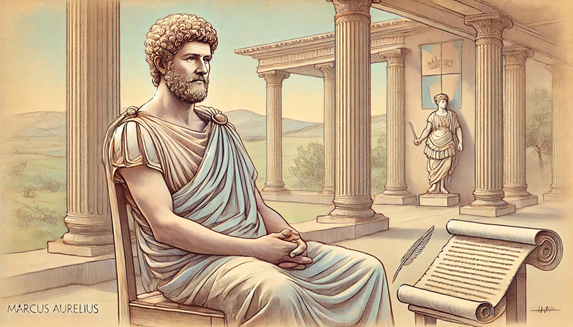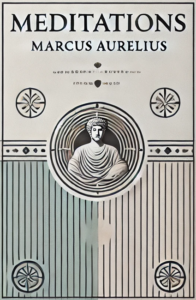SUMMARY
- Meditations is a collection of personal writings by Marcus Aurelius, reflecting his thoughts on Stoic philosophy during his reign as Roman Emperor.
- The central themes include self-discipline, virtue, and the transient nature of life, emphasising rationality and ethical living.
- Aurelius advocates for mastery over desires and emotions, promoting inner strength and resilience in the face of external chaos.
- Pursuing virtue is highlighted as the highest good, encouraging harmony with nature and understanding one’s role in the cosmos.
- The work offers timeless wisdom on living a meaningful life, inspiring readers to cultivate inner peace and resilience in the face of adversity.
REVIEW
Meditations by Marcus Aurelius is a timeless work that offers profound insights into Stoic philosophy and personal development. Written as a series of personal reflections, this collection provides a unique glimpse into the mind of a Roman Emperor grappling with the complexities of leadership and the human condition.
Meditations is composed of twelve books that serve as a guide for self-improvement and ethical living. Through his writings, Marcus Aurelius explores themes of self-discipline, virtue, and the impermanence of life. His reflections are deeply rooted in Stoic philosophy, emphasising the importance of rational thought and ethical behaviour. The work’s impact lies in its universal appeal, offering wisdom that transcends time and culture, resonating with readers seeking guidance in their own lives.
The book’s enduring influence is attributed to its practical advice on dealing with adversity and maintaining inner peace. Aurelius’s Meditations provide a framework for understanding one’s place and the significance of living in harmony with nature. His emphasis on accepting the transient nature of life and focusing on what is within one’s control has inspired countless individuals to adopt a more stoic approach to life’s challenges. Central to Meditations is self-discipline, where Aurelius advocates mastery over one’s desires and emotions. He stresses the importance of maintaining a rational mind, free from external distractions. This focus on inner strength and resilience is a key tenet of Stoic philosophy, encouraging individuals to cultivate a sense of calm and clarity in the face of chaos.
Another significant theme is the pursuit of virtue, which Aurelius views as the highest good. He encourages readers to live in harmony with nature and to fulfil their roles within the larger cosmos. By understanding the interconnectedness of all things, Aurelius believes one can achieve a sense of purpose and contentment. His reflections on mortality and the fleeting nature of life serve as a reminder to live with intention and integrity.
Meditations’ ability to speak to the human experience across centuries makes it special. Marcus Aurelius’s reflections offer timeless wisdom on living a meaningful and virtuous life. The book’s blend of philosophical insight and practical advice inspires readers to cultivate inner peace and resilience in the face of life’s challenges.

CHARACTERS
Marcus Aurelius: The author and Roman Emperor, who reflects on Stoic philosophy and personal growth throughout his writings.
Philosophers: Various unnamed Stoic philosophers whose teachings influenced Aurelius’s thoughts and practices.
Family: Aurelius mentions his family members, including his wife and children, as sources of love and responsibility.
Soldiers: The unnamed soldiers and generals serve as a backdrop to Aurelius’s reflections on leadership and duty during military campaigns.
The Universe: A conceptual character representing the broader cosmos, which Aurelius contemplates concerning human existence and virtue.
LOCATIONS
Rome: The heart of the Roman Empire and the primary location of Marcus Aurelius’s reign, symbolising power and governance.
Sirmium: A significant military base and administrative centre in the Roman Empire, where Aurelius spent time during his campaigns.
Aquincum: A Roman settlement in present-day Budapest, Hungary, where Aurelius likely reflected on his experiences during military operations.
Dacia: A region corresponding to modern-day Romania, known for its conflicts with the Roman Empire during Aurelius’s reign.
Marcomannic Wars: The series of conflicts against Germanic tribes, primarily in Central Europe, where Aurelius faced numerous challenges.
Athens: A centre of philosophy and learning, representing the intellectual backdrop against which Aurelius developed his Stoic beliefs.
Cappadocia: A region in modern-day Turkey where Aurelius campaigned and reflected on the nature of leadership and duty.
Nicomedia: A vital city in Bithynia (modern Turkey), a strategic location during Aurelius’s military campaigns.
Antioch: A significant city in ancient Syria, known for its cultural diversity and significance in the Roman Empire during Aurelius’s time.
Ephesus: A prominent city in Asia Minor (modern Turkey), representing the artistic and philosophical influences that shaped Aurelius’s thoughts.
IMPROVES
- Creativity and Imagination: Reading Marcus Aurelius can inspire new ideas and perspectives, enhancing creative thinking.
- Emotional Intelligence: His teachings encourage self-reflection and understanding of emotions, fostering better interpersonal relationships.
- Self-awareness: The book promotes introspection, helping readers understand their thoughts and behaviours more deeply.
- Mental Health: The Stoic principles can provide tools for managing stress and anxiety, contributing to overall well-being.
- Leadership: The insights on virtue and responsibility can help readers become more effective and ethical leaders.
REFERENCES
- Book Review: Meditations by Marcus Aurelius – Warm Days Will Never Cease
- Analysis: Excerpt from Meditations, Book I – EBSCO Research Starters
- Marcus Aurelius Meditations and Its Interpretation With Christian Contemporary Thought – PDX Scholar
- An Analysis of Marcus Aurelius’s Meditations – Routledge
- Criticisms of Marcus Aurelius from Roman Histories – Donald Robertson

